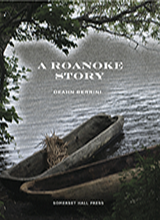Deahn Berrini - A Roanoke Story. Reviewed by Mopsy Strange Kennedy.
(“This Land is Our Land. A novel look at a centuries-old mystery.” in The Improper Bostonian, Feb 07, 2018)
(Also cited at: Lutheran Indian Ministries)
The Native Americans who populated Roanoke, North Carolina, in 1587 lived in a world full of rich and mystical traditions as Deahn Berrini describes in A Roanoke Story. The work of historical fiction tells the story of 115 English men, women and children who showed up on the shores of the bay one day—and just as quickly mysteriously disappeared.
Told from the tribe’s perspective in a storytelling mode that densely captures the Roanoke ethos and language, Berrini presents leaders and healers and many tribal characters, including the charming Keeta, who’s engaged in the world of planting and experiences her body becoming a turtle, seemingly a message from her ancestors regarding strength and solidity. The book often shows members identifying with the spirit of particular animals: the bobcat for stealth; the hawk for hunting; and the fox for adaptability. One warrior member, Wanchese, wears a black crow feather that represents his spirit-traveler self as a symbolic diplomat connecting the body and the spirit.
The close-knit tribe’s life is threatened by the ominous appearance of white men in canoes. The Roanokes are caught between accommodating and resisting what gradually appear to be hostile English colonizers. These people bring poison arrows, their style is coarse, they mistreat animals and disrespect trees. They consume the tribe’s food without reciprocity—a move that highlights the very different sacred and beautiful ways of the Roanokes. The colonizers’ intentions soon come to light in a blood-filled scene. And then, the British visitors disappear, leaving “not a button, nor shoe, nor note.” Berrini, a Boston College Law grad and longtime North Shore resident, has novelized this historical story, bringing us inside a tale packed with names and roles, glossary included.
From page 99: “Keeta bent over the slippery cord, put it between her teeth and bit quickly. As she did she felt her baby’s spirit leave her like a puff of wind, to go his own way.”

